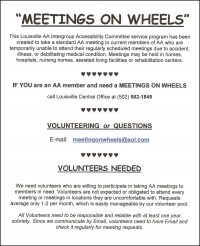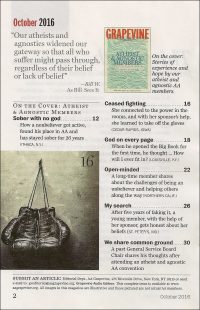God on Every Page

The first issue of the AA Grapevine was published in June of 1944. This year, in October, for the first time ever an issue was devoted to the stories of atheists and agnostic members of AA. Here is the introductory welcome by the editor of the Grapevine:
This month, our special section features stories by atheist and agnostic AA members, some who have many years of sobriety. One member quotes our co-founder Bill W., in a 1946 Grapevine, “…an alcoholic is a member if he says so… we can’t force our beliefs or practices upon him”. In editing these stories, we honored the request of some authors to not capitalize the word God, which is our usual style. Bill W. intended Grapevine to be a mirror of the Fellowship. We hope these stories will shed some light on the joys and challenges of our atheist and agnostic members.
In the story “Sober with no god,” a nonbelieving AA member with 26 years expresses his thoughts about a Higher Power. In “God on Every Page,” a member’s sponsor – a Christian – helps him learn to get sober and stay sober, he says, “without all that God stuff”. A member in California shares a challenging experience with starting a freethinkers’ group in “Open-minded”. And an ordained Episcopal priest and past Chair of the AA General Service Board shares his thoughts – after attending the first secular AA conference – in “We Share Common Ground”.
Two weeks ago we shared one of the stories, Open-Minded. Today we are sharing another one, God on Every Page. And here it is:
When he opened the Big Book for the first time, he thought … How will I ever fit in?
By Alex M.
Copyright © AA Grapevine (October, 2016)
Recently I visited a relative in Maine who asked me only one question about AA: “Is it religious?” My first thought was, Of course it is. Instead I paused, and told her she had asked the $64,000 question.
I thought back to that bleak day 10 years ago when I washed up into AA, still a bit tipsy, beaten into a state of reasonableness and literally dying to find a way out of my alcoholic addiction. As my head cleared, I started reading the Big Book, and since the word God seemed to be on almost every page, I thought I had to return to the Christianity I was raised under in order to get sober.
I soon realized our book didn’t actually say I had to return to the God of my youth. But I felt it strongly implied that those who really got the program and stayed sober eventually returned to their faith in good old American fundamentalist Christianity. I was so depressed. I’d never fit in with these people, I thought.
Fortunately I found a wonderful sponsor, a born-again Christian no less, who was instrumental in taking me through the Steps, including the God parts, and showed me how I could find a new way of living free from that hopeless state of mind and body I had dragged into AA with me.
We read the Big Book side-by-side, often re-reading “We Agnostics” and the Appendix II on spiritual experience. He said that if I didn’t have the power myself to stop drinking and manage my life, I’d have to rely on some other power that did. The main thing was that power had to be greater than me.
We discussed the Oxford Group’s Four Absolutes and the Buddhist’s Eightfold Path. He suggested I could replace the word God with Good, or with Higher Power or Group of Drunks or Good Orderly Direction. Our book called it God, but we can call it anything we want.
Had I believed in God there would have been no problem, but I didn’t. Try as I might, I could not convince myself I had an ethereal friend who would direct my will according to some predetermined life plan. So how could I get sober and stay sober without all that God stuff?
I asked those who had what I wanted if they believed in God, and if not, how they stayed sober. I was amazed at the number of people who spoke of their reliance on a truly spiritual force to stay sober, and never referred to God. They told me how they had worked through the Steps and slowly discovered that their Higher Power had nothing to do with God or religion.
As I went through the Steps, I came to believe in a higher purpose, not a higher being, to help me change the way I thought and acted. My higher purpose is to live by the principles of the Steps. The power I draw on is that unsuspected inner resource which makes me willing on a daily basis to strive for honesty, integrity, compassion, tolerance, humility, love and service. After cleaning house, sharing my faults, making restitution and starting to help others, I was relieved of my obsession to drink and much of my selfishness and self-centeredness. I became grateful for what I had and was much more comfortable in my own skin.
So how did I answer my friend’s question? I told her AA is a spiritual program although many of its members are religious. I said the Big Book was not simply an instruction manual, but a historical document, and reflected the predominately religious roots and views of its early members.
Our book is not perfect, but it does try to keep the door open to atheists, agnostics, freethinkers and alcoholics from all walks of life. Today, I don’t need God to have a higher purpose in my life and to practice the principles of the Steps. I simply need to believe that with help from the Fellowship and my inner resources, I can change my own attitude and actions and continue to enjoy the enormous benefit that change has brought into my life.
Alex M. is a retired physician living in Louisville, KY where he got sober 10 years ago. Service work is the foundation of his recovery. He is active in sponsorship and at many levels in his local Intergroup.
 Since so many newcomers flee AA because of the “God stuff”, Alex believes his responsibility is to share his experience on how recovery can be attained through AA and the Big Book when one does not believe in a God of someone else’s understanding. His home group, Beyond Belief, was started in 2015 and and is the only atheist-agnostic meeting in Louisville.
Since so many newcomers flee AA because of the “God stuff”, Alex believes his responsibility is to share his experience on how recovery can be attained through AA and the Big Book when one does not believe in a God of someone else’s understanding. His home group, Beyond Belief, was started in 2015 and and is the only atheist-agnostic meeting in Louisville.
In 2010, Alex started the “Meetings On Wheels” program (click on the image above to enlarge it), which has taken AA meetings to hundreds of alcoholics in his community who were unable to attend regular meetings due to medical conditions or legal restrictions. An article on this remarkable service, “24 Hour Delivery”, was published in the Grapevine in February, 2014.
In all, a total of six articles by Alex have been published by The Grapevine over the last six years. He has also published in the Kentucky Area AA Newsletter and has a chapter in Do Tell! Stories by Atheists & Agnostics in AA. You can read that chapter by clicking here: A Friend of Jim B. Alex is currently writing a secular 365 daily meditations book called Daily Reprieve. It will be similar in format to the Twenty-Four Hours A Day book by Richmond Walker. We look forward to this book!


























Thank you, Roger, for reprinting this Grapevine Article, and thank you, Alex, for writing it.
I identify and resonate with so much of your experience and admire how you practice the inherent spiritual principles of recovery without a specific belief in a god of any conception, that your spirituality comes from within yourself in accordance with the higher purpose that you successfully manifest through living sober. I grok it !~!~!
I especially appreciate and congratulate you and the Louisville Intergroup for the “Meetings on Wheels” program to take AA meetings to incapacitated people in their homes, hospitals and nursing facilities. This is AA General Service work of carrying the message of AA recovery at its best. Thank you.
I just received the latest Grapevine issue focusing on atheist and agnostic members. I haven’t read all the articles but the one that had my undivided attention was written by Ward B. Ewing Trustee Emeritus, past Chair (non-alcoholic) of the General Service Board. Ordained Episcopal priest, retired President of The General Theological Seminary. Whew! That’s a mouthful!
He wrote, in part: “I do not understand how anyone might be excluded because of theology. Intolerance born of religious certainty is as old as the hills and as destructive and ugly today as it has been in the past. This Fellowship has always found unity through love and tolerance, not theological agreement”. Spot on in my humble opinion. I wonder what the Executive Committee of Toronto Intergroup thinks of that? Hmmm?
Murray
I’ve belonged to two religious organizations, the Roman Catholic Church, and Alcoholics Anonymous. That said, I’m a believer in attempting some sort of secularized version of the 12 steps.
Self-examination, amends, helping others, etc. are esteem building, and they create purpose. I needed all of that. The me who arrived in AA needed to change in a major way to become a person content to be sober.
Nice article. We continue to move forward, and to extend our helping hand.
As a former Grapevine rep, current subscriber, co-founder of a new Without a Prayer Group of AA – both listed in GSO and our local Intergroup meeting list, along with the two other Atheist/Agnostic groups in our district – I was excited and pleased to read the October issue and bought several more copies to share with my fellow travelers and newcomers. At my GS business meeting this week, the district GV rep gave an impassioned tribute to this month’s issue, but I was the only GSR who openly applauded her share! “Sometimes quickly, sometimes slowly” the spirit of H.O.W. is finally cracking open to allow the light of enlightenment to shine through. See you in Austin!
Thank you for understanding. I quit going to meetings recently after over 18 months sober because of the god thing. They would say its not about god but talk about praying and having faith at the same time. The last two meetings I went to there were two individuals who had been been coming back several times saying they are trying but can’t stop. They tell them to pray and keep coming back. I would suggest that they might try to look at other options like counseling I was shot down big time. That was it for me! I’m proud to be an outlier!….thank for what you do!!!
Roger
I am so happy to see you back in circulation as of old !
Thank you for all you do.
ChiswickMichael
London
Thanks to all for continuing the conversation. I struggled long and hard trying to decide if I should leave AA or not because of their God bias. What kept me active in AA were two things:
First, I believe, like Dr. Bob, that I have a duty to try to carry the message. It’s my job, like it or not.
Second, when I asked myself how can I, a non-believer, best carry the message of AA, I said I’ll find a way.
I had to let go of my resentment on how the book was written. I had to focus on the texts that suggests we choose our own Higher Power – and what all of that means. I had to admit that I cannot stay sober by total self-reliance – I needed a higher purpose or force or universal connection in my new life.
So I let go of my anger and frustration with what I don’t like about how the program is presented and shared my experience on how AA helped me, a non-believer, get and stay physically and emotionally sober. If I don’t stay in AA, it’s hard to carry the message that anyone can recover, regardless of their beliefs. I have to stay inside the tent to help other struggling alcoholics.
PS: I enjoyed all the articles, but as noted, the excellent piece from Trustee Ward B. Ewing provided some hope that not everyone at GSO is intolerant of freethinkers.
Yes you put into words exactly why I’m back reading this and other articles on this site – my belief in the healing power of AA without religious definitions of spirituality. Soon I will have the strength of conviction to be able to attend ordinary AA meetings again – there are no agnostic meetings in my area but as I grow in the program I would love to try and establish one as part of my 12th Step… when I get to it, although there is no rule that the steps should be done in order.